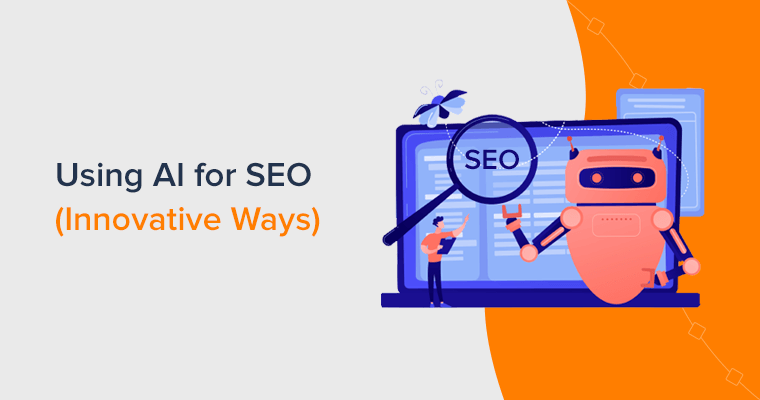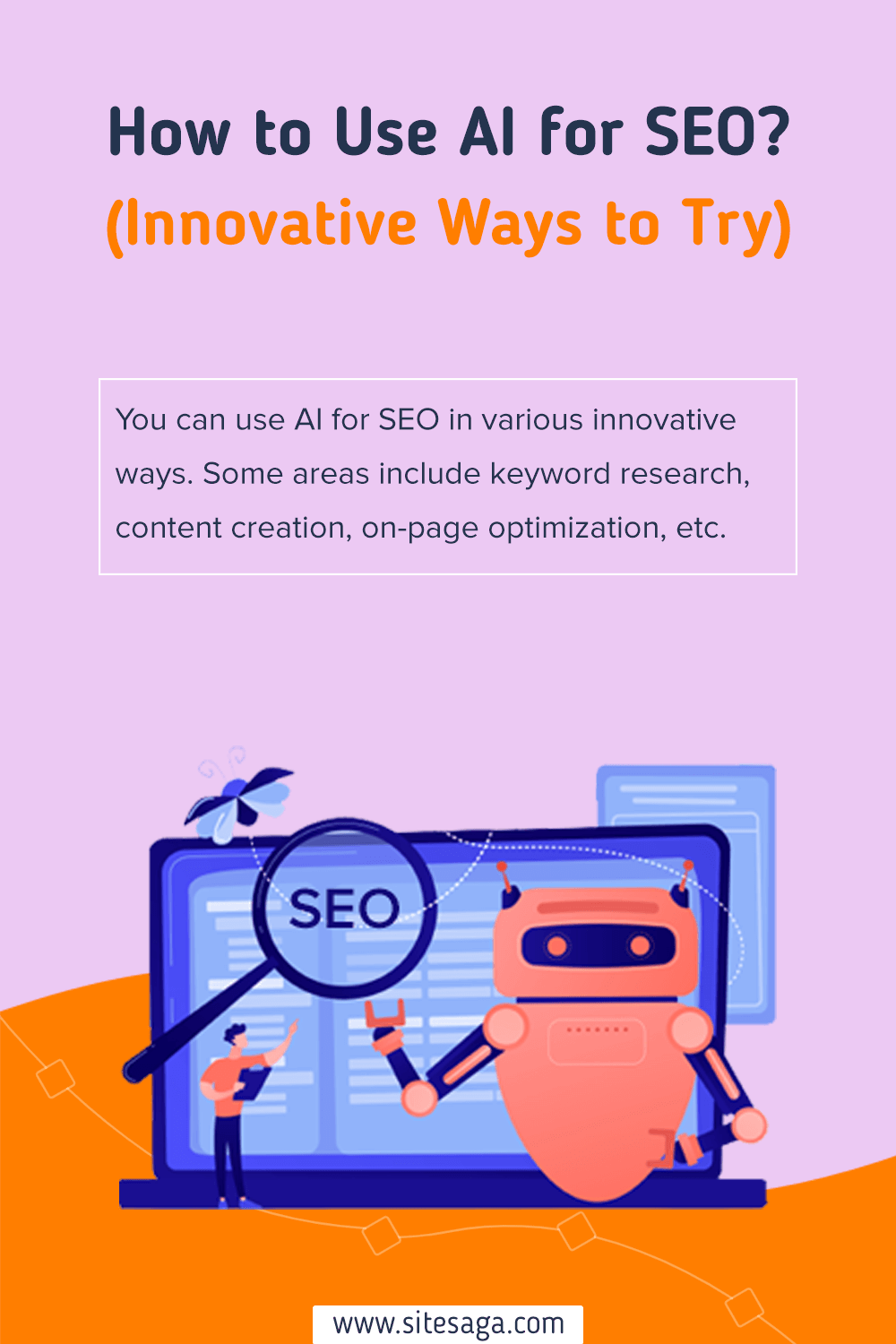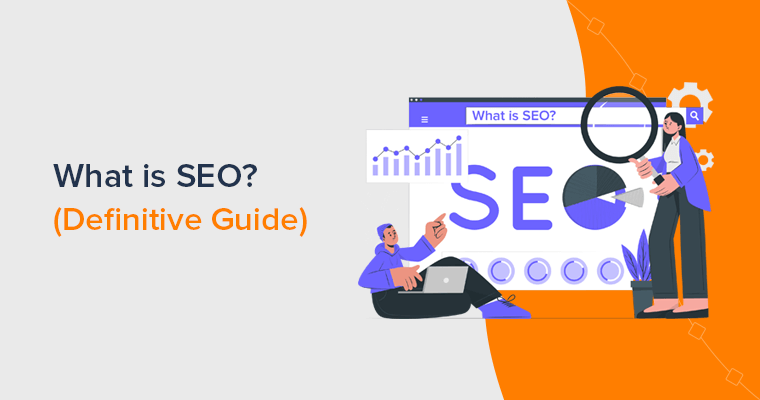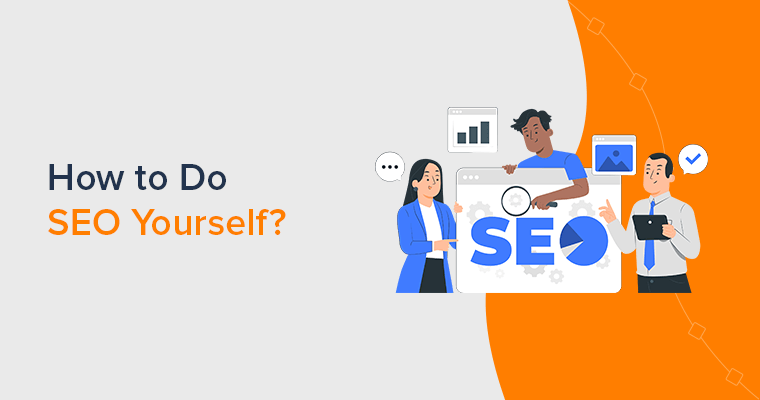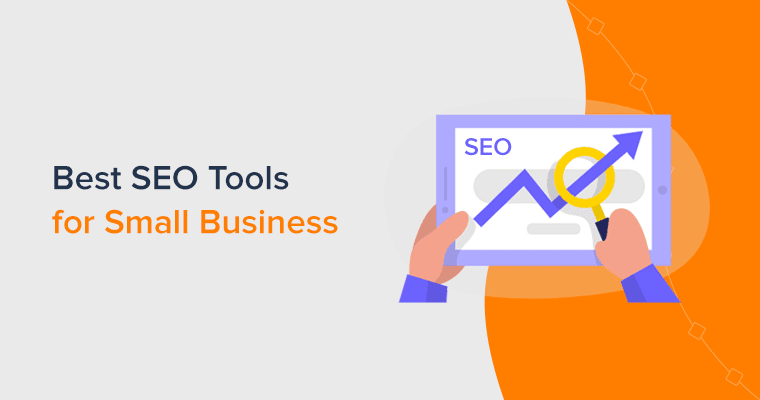Are you wondering how to use AI for SEO? Or looking for innovative ways to use AI for SEO? If yes, then stay right here.
In today’s digital age, leveraging the power of Artificial Intelligence (AI) can give you a significant edge in Search Engine Optimization (SEO). Plus, there are many innovative ways to harness its potential and improve your website’s rankings.
Whether you’re an SEO professional or a business owner, using AI techniques is advantageous. It improves your online presence and helps you stay ahead of the competition. So, want help finding those game-changing ways?
This article shows 9 innovative ways to utilize AI for SEO. From keyword research to analyzing data, AI offers numerous tools to revolutionize your SEO strategy.
Without any delay, let’s begin!
Definition of AI and Its Implications for SEO
First, let’s learn about AI and its implications for SEO.
Artificial Intelligence (AI) is the creation of computer systems that can perform tasks requiring human-like intelligence. It involves algorithms and models that process information, learn, make intelligent decisions, and solve complex problems.
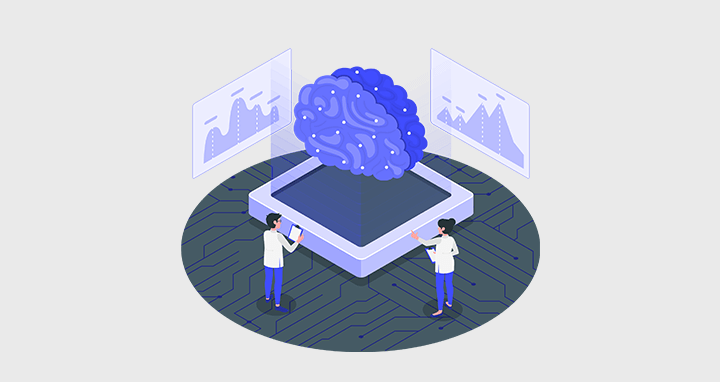
Moreover, AI contains many techniques and methodologies. That includes machine learning, Natural Language Processing (NLP), computer vision, robotics, etc. All of that helps machines understand and interact with the world.
For instance, a key aspect of AI is machine learning. It lets systems learn and improve from experience. Simply put, machine learning algorithms detect patterns, identify trends, and make predictions or decisions after utilizing large datasets.
Hence, the primary aim of AI is to develop machines that mimic human intelligence. So that it performs tasks with similar efficiency and accuracy. It has the potential to enhance productivity, drive innovation, and tackle complex challenges.
Impact of AI Tools in the SEO World
SEO (Search Engine Optimization) involves the process of improving a site’s visibility in search results. It plays a crucial role in the success of your business online.
The revolution of AI is occurring in various fields, including SEO. Hence, you’ll find many techniques and capabilities to improve website rankings and online visibility.
AI-powered SEO tools leverage machine learning algorithms to analyze large volumes of data. This uncovers valuable insights about user behavior, search patterns, and trends. Ultimately, you can make informed decisions.
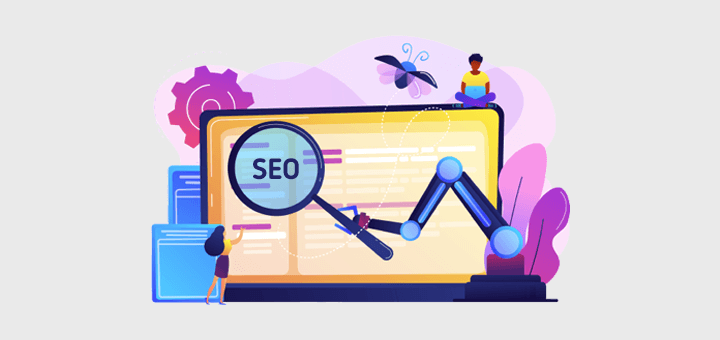
Other than data analysis, AI tools impact SEO through automation and efficiency. These tools can automate SEO tasks like keyword research, content optimization, and link building.
Moreover, automating repetitive and time-consuming tasks saves you time. Also, you’ll have valuable time to focus on strategic activities.
Ongoing Discussions on Combining AI and SEO
Many ongoing discussions surround the use of AI for SEO. This includes:
- Firstly, there’s a concern that people may use AI to carry out unethical or manipulative tactics for improving a website’s rankings. It’s called black-hat SEO. So AI may be unethically used to gain an unfair advantage.
- Secondly, another concern is the quality and originality of AI-generated content. People state that there must be the right balance between human creativity and AI automation in content creation.
- Thirdly, there are concerns about bias in AI algorithms used in SEO. If the data used to train AI algorithms contains biases, then they can unintentionally be reflected in search results.
Overall, using AI in SEO has a positive impact on a website’s visibility. But you should use them ethically, not fully depend on them, and add your own flavor for a personal touch.
Now, let’s start using AI for SEO in the 9 innovative ways we shortlisted!
How to Use AI for SEO? (9 Innovative Ways)
Unlock the power of AI in your SEO strategies with these 9 innovative approaches. From keyword research to advanced data analysis, AI can take your SEO efforts to new heights.
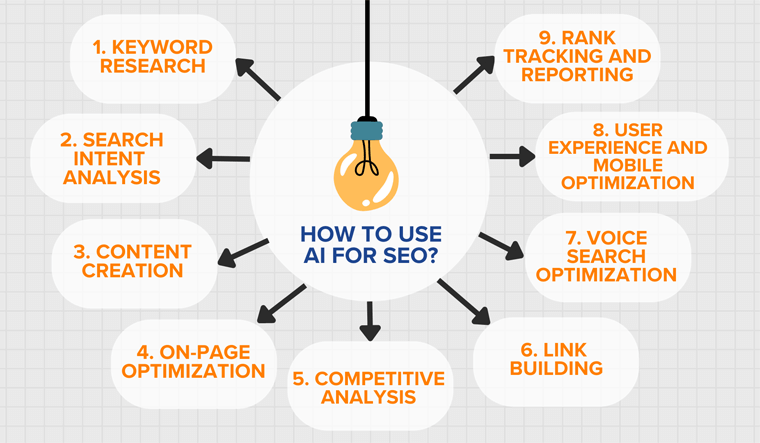
Discover how AI-powered tools and techniques can automate tasks and drive traffic. So that your website ranks incredibly well in search engine results pages. Here we go!
1. AI-driven Keyword Research
Keyword research is a vital part of SEO. It lets you understand the terms used by your target audience when they search for any information, product, or service online.
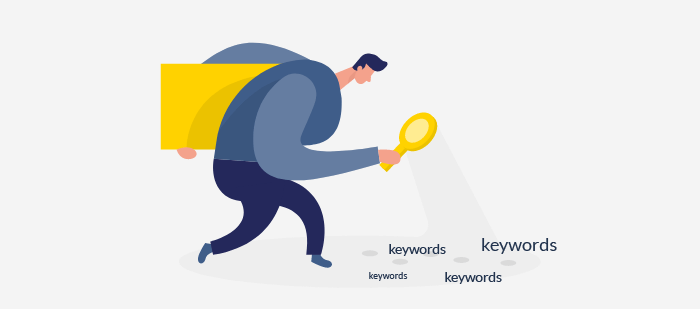
You can find AI-powered keyword research tools that use algorithms and machine learning techniques. With that, they gather and analyze large volumes of sources. As a result, they have the ability to identify and analyze keywords relevant to a topic or niche.
Simply put, such AI tools can identify patterns, trends, and relationships within the data. Then, provide valuable insights and suggestions for sustainable keyword targeting.
How to Use AI for Keyword Research?
You can use AI for keyword research for various purposes. So, you should define your goal first. For example, a crucial goal can be to improve your site’s search engine visibility.
Now, follow these basic steps for using AI in keyword research.
First, you must select an AI-driven keyword research tool that aligns with your budget and requirements. Some popular tools are Semrush, Ahrefs, Moz Keyword Explorer, etc.
For instance, we’ll show you the process by using Semrush. Similarly, you can use any tool following a similar process.
For beginners, Semrush is a toolkit with numerous tools for SEO and content marketing. Further, you’ll also find market research, advertising, and social media tools.
Do you want to use Semrush for your entire SEO improvement? Then, learn how to use Semrush for free with this complete guide now!
So, visit Semrush, sign up, and log into your account. Then, open the ‘Keyword Magic Tool’. There, enter a keyword related to your niche and click the ‘Search’ button.
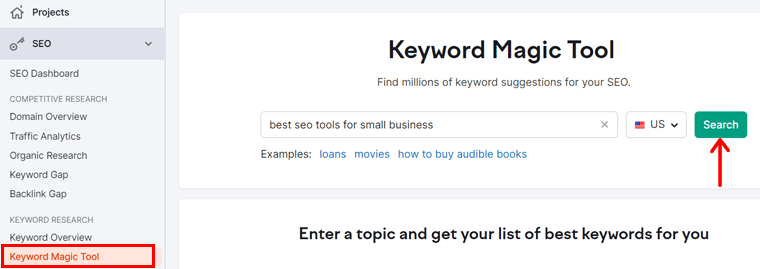
Now, Semrush generates relevant keyword suggestions based on your given keyword. Further, the suggestions include related keywords, long-tail keywords, and other variations. In this way, you’ll discover keywords you may have missed during manual searches.
In addition, you can access the search volume, competitive density, knowledge density, and many other insights for each keyword. Check out this screenshot below:
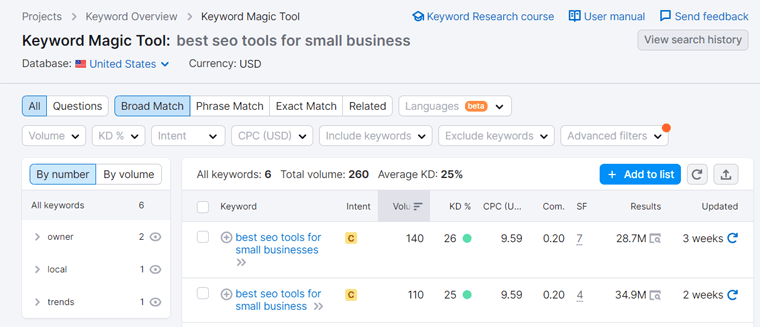
Hence, using an AI SEO tool like Semrush for keyword research gives these advantages:
- The search volume of each keyword lets you understand its popularity. Knowing how frequently they’re searched for in search engines lets you prioritize them.
- The difficulty level of the keywords shown is based on various factors. Using this, you can choose keywords with higher chances of success.
- Gives insights into the keywords your competitors are targeting to discover keyword opportunities and adjust your SEO efforts.
Note: You must review and refine the keyword list based on the insights your AI SEO tool provides. Also, apply human expertise for better understanding and results. Plus, you should continuously monitor the changes and update your strategy.
2. Search Intent Analysis
Search intent is what a user is trying to achieve with their search query. Commonly, it can be divided into these 4 types:
- Informational: When a user wants to find an answer to a specific question.
- Navigational: If a user wants to visit a specific website.
- Commercial: When a user searches for information about a product or service with the intent of buying it.
- Transactional: If a user wants to buy a product or service.

Understanding search intent is vital for SEO. Because it helps your content rank for relevant keywords. Further, your content will also be relevant to the audience and improve their user experience.
With the use of AI technology, understanding search intent becomes simpler. Moreover, you’ll find specific AI tools to use for search intent analysis. This helps you improve your chances of ranking high in search results and attracting more qualified website traffic.
How to Use AI for Search Intent Analysis?
Initially, you must pick a suitable tool for search intent analysis. Some popular choices are Semrush, Surfer SEO, etc.
Undoubtedly, you must be aware of search intentions right from the start, i.e., the keyword research process. This also means that SEO tools with AI capabilities let you access this information when analyzing your keywords.
So, when you’re using Semrush’s Keyword Magic Tool for keyword research, you’ll find the search intent for the keyword. It’s right in the ‘Intent’ column, as shown below:
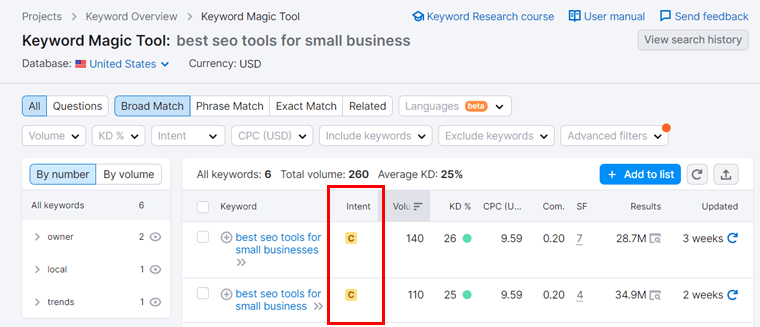
Now, let’s see how to make good use of it.
By now, you know the search intent for the keyword you want to use in your content. So, you can optimize your content to match the audience’s needs.
For example, when the search intent is transactional, you can highlight the benefits of your product or service that encourage users to buy.
On top of that, you must optimize your existing content. This includes adding keywords, proper content structuring, and making the content more readable.
Note: Ensure your AI tool uses data from various sources for user intent analysis. So, it’s crucial to carefully select the most beneficial tool for your business.
3. Content Creation
Content creation is the formation of new site content, like blog posts, product descriptions, etc. This content must be informative, high-quality, and relevant to the target audience.

Indeed, having proper website content not only attracts users but also leads to improvements in SEO. But how can AI be used for content creation?
You can find AI tools that can automatically generate website content. Using them, you can publish high-quality content easily and quickly.
In fact, you can personalize the content for individual users. Hence, you can use targeted content based on the user’s interests, demographics, or location.
How to Use AI for Content Creation?
Here, we provide you with some tips for using AI for content creation. First, make sure you’ve identified the keywords to use in your content to rank for them.
After that, you must use an AI content writer tool to generate content based on those keywords. Some examples of those tools are ChatGPT, SEO.ai, Jasper.ai, etc.
For example, let’s learn to use ChatGPT for content generation.
ChatGPT is the leading language model that you can use as a content-writing tool. Based on the proper prompt you provide, it’ll give you the content in no time.
So, sign up and open your ChatGPT account. Once you do that, you can see a chat-like interface. There, you can give a prompt like this:
“Please write the content for the About page of the website ‘[website name]’ using the keyphrase ‘[focus keyword]’.”
In a few seconds, you’ll receive your website content like this:
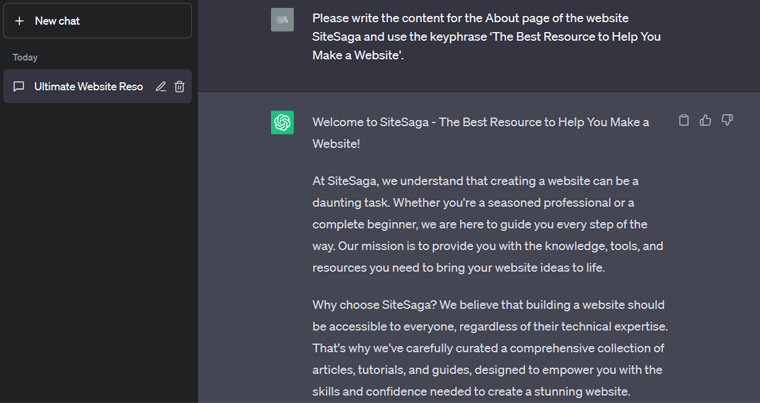
Note: Please rewrite the content in your own words and check the facts beforehand. This reduces plagiarism chances and gives your content originality.
Not to mention, you can use ChatGPT for many SEO aspects. Learn how to use ChatGPT for marketing with this ultimate guide.
Additionally, you may be wondering how content SEO and technical SEO are different. Check out this comparison blog on content SEO vs technical SEO to find out!
4. On-page Optimization
On-page optimization involves making your website content more search-engine-friendly. It includes improving your website elements to rank higher in search results.

Overall, here’s a list of on-page optimization factors:
- Using relevant keywords throughout the content without overusing them.
- Proper content structuring so that users and search engines can easily understand.
- Optimizing the title, meta description, and URL structure.
- Adding relevant internal links to other relevant content on the website.
- Optimizing the images and videos, including their file names, alt tags, etc.
Hence, AI-driven tools can give suggestions on optimizing existing content. All of that improves your content’s readability, visibility, and structure.
Are you confused between on-page SEO and off-page SEO? Then, read this comparison article on on-site SEO vs off-site SEO to clear all your doubts.
How to Use AI for On-page Optimization?
We know, you must use an AI content optimizer tool to optimize the content for search engines. Some popular tools are Surfer SEO, MarketMuse, Rank Math, etc.
For instance, let’s use Rank Math’s Content AI tool, which analyzes your content and gives SEO recommendations. Note that Rank Math is for WordPress websites. So, here we go!
First, install, activate, and configure Rank Math in your WordPress dashboard. Learn how to install a WordPress plugin here.
After that, enable the ‘Content AI’ module in the Rank Math > Dashboard > Modules interface.
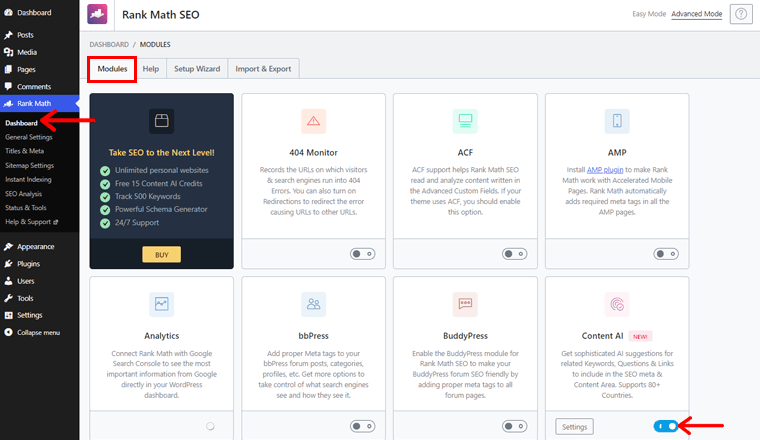
Following that, open your post or page with the content you created. There, click the ‘Rank Math SEO’ icon at the top-right. Then, add your keyword and hit the ‘Content AI’ button.
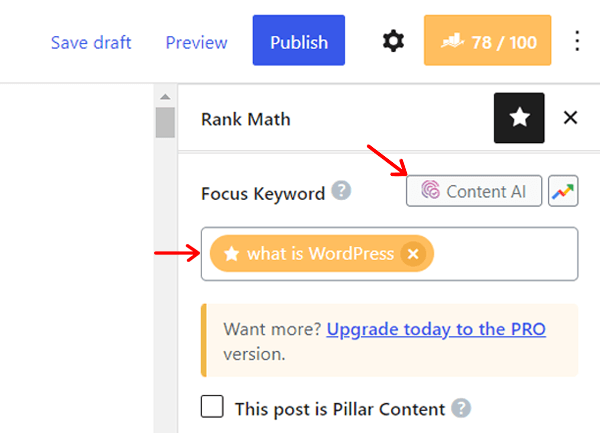
Next, click the ‘Research’ button. This gives you color-coded scores on multiple factors like word count, link count, heading count, and media count.
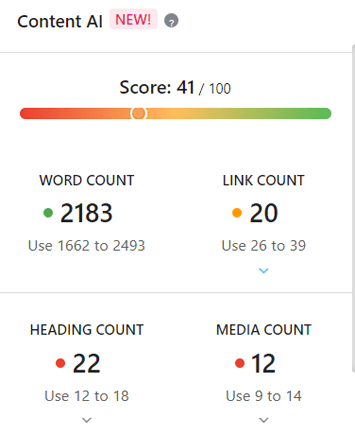
After that, you’ll also see 3 areas: Keywords, Questions, and Links. There, it gives suggestions on your keywords, headings, images, links, etc.
By following these tips, you can optimize your content and other on-page elements for better SEO performance.
Similarly, you can use tools like Site Audit and On-page SEO Checker by Semrush. It gives more technical suggestions to improve your website’s performance.
Note: Your keywords and goals must be accurate from the start. Only then, you’ll get the desired results after on-page optimization. Further, you must analyze your site’s performance to ensure your AI SEO tool is working well for you.
5. Competitive Analysis
Competitive analysis is the process of researching your competitors. Further, it involves gathering insights about their SEO strategies, strengths, weaknesses, progress, and future moves.

AI techniques let SEO tools crawl and collect competitor’s data from their website, social media, marketing strategies, etc. And their analysis leads you to understand their site content, social media presence, and other online activity.
How to Use AI for Competitive Analysis?
As mentioned before, you can use AI SEO tools to analyze the keyword competition. This lets you identify keywords that your competitors are targeting. Other than that, you can learn about their backlink profile, content performance, and social media engagement.
Now, let’s take a snapshot of using an AI SEO tool for competitor analysis.
Indeed, numerous tools are present that let you perform competitive analysis. Some of them are Semrush, Ahrefs, Moz, SpyFu, etc. So, let’s learn the process using Semrush.
On your Semrush account, open ‘Domain Overview’. There, enter your website domain and hit the ‘Search’ button.
In the ‘Main Organic Competitors’ section, you’ll find some of your top competitors.
Afterward, enter a competitor website’s domain and hit the ‘Search’ button in ‘Domain Overview’. Here, you’ll find information about their traffic, backlinks, keywords, etc.

Additionally, you can enter your domain and other competitor domains in the ‘Compare domains’ section. Then, click the ‘Compare’ button. This gives a performance overview of your and those competitors in a comparative format.
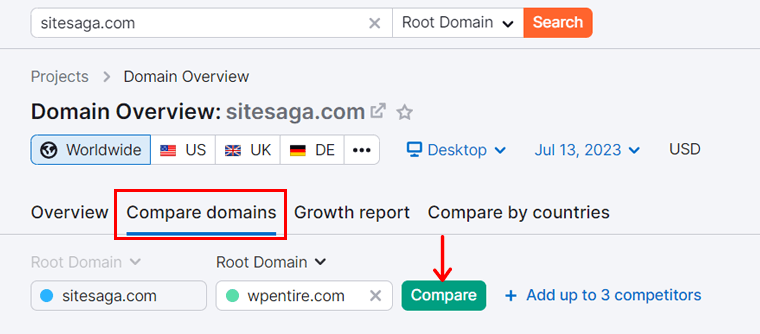
With that, you can analyze the insights to find the following things:
- Analyze competitors’ strengths and weaknesses by understanding their site content, social media presence, and other online activity.
- Track their progress by monitoring their website traffic and other online metrics.
- Predict their future moves by analyzing their past behavior and current trends.
- Adjust your marketing strategies, product offerings, or pricing based on the findings.
Note: The competitors’ insights on AI tools can sometimes be inaccurate. So, it’s better to use more than one tool before making any decisions on your website. Also, you can research yourself to get a complete picture of your competitors.
6. AI-powered Link Building
Link building involves increasing the number of links from other websites pointing to your website. This improves your site’s authority and relevance in search engines. Hence, you must increase the quantity of high-quality inbound links to your pages for SEO.
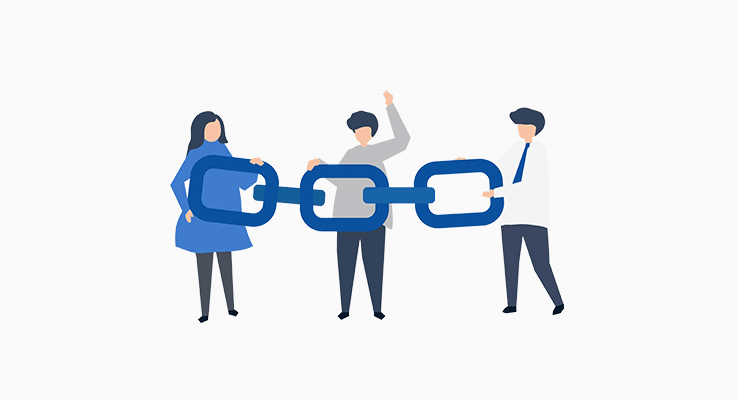
Here’s a list of ways to build backlinks:
- Creating high-quality content that other sites can most likely link to.
- Writing blog posts for other sites with a link back to your website.
- Submitting your website to directories that list your site.
- Sharing your site content on social media and encouraging others to also do so.
Basically, AI can analyze large datasets of websites and point out those that are likely to be quality backlink sources. Because these AI SEO tools consider factors like traffic, domain authority, and relevance.
Now, let’s learn how to use AI for link building and boosting your website’s SEO.
How to Use AI for Link Building?
Semrush, Ahrefs, and Majestic are some popular link-building tools. Here, let’s take the example of Semrush and its AI capabilities.
The best way to find quality backlinks is by analyzing your competitors’ backlink profiles. Hence, you must collect your competitors’ domains first.
To search for backlinks for specific content, you must analyze competitors for the content’s keywords. So, you’ve also got to find the right keywords.
We already know how to find keywords and competitors. But make sure to add a project to your Semrush account for your website. Then, open ‘Link Building Tool’.
There, select your project and hit the ‘Start Link Building’ button.
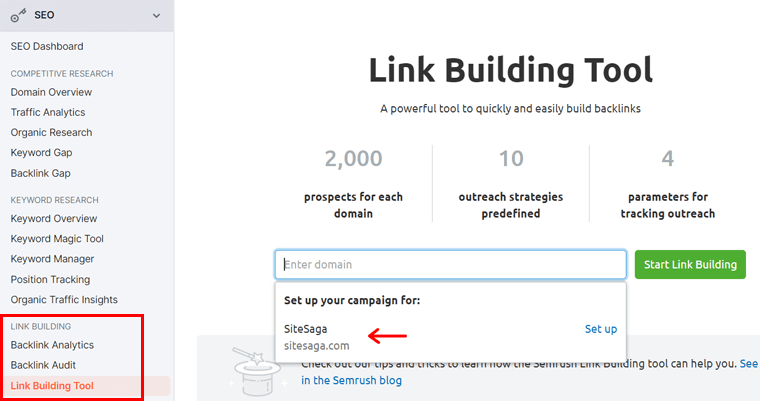
Now, you must add your keywords on the ‘Keywords’ tab. Next, insert your competitor’s domains on the ‘Competitors’ tab. Lastly, click the ‘Start Link Building’ button.
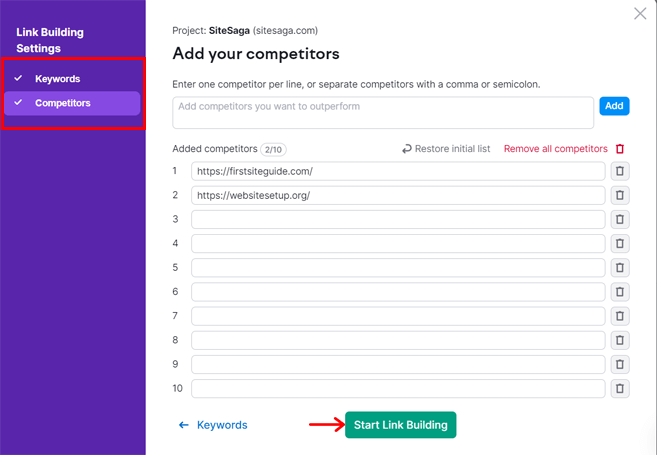
Once the AI SEO tool completes the analysis, hit the ‘View Prospects’ button. This lists all the possible backlinks you can target.
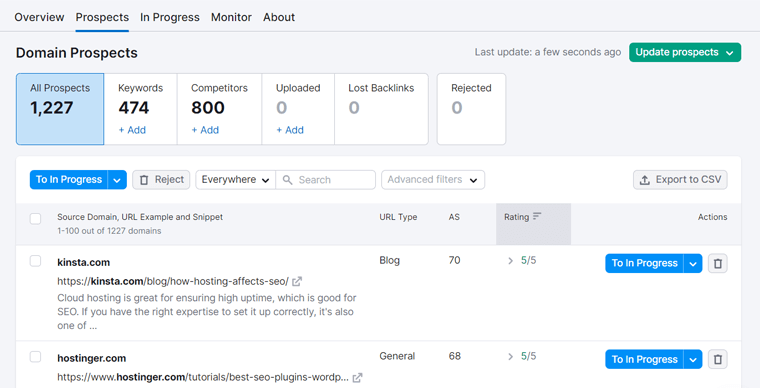
With that, you can reach out to the most prominent website owners and ask them to link to your site. In addition, you can send a personalized message explaining why it would be a valuable addition to their site.
Note: Please focus on quality over quantity. Having a few high-quality backlinks is better than having several low-quality backlinks. In addition, you should use a backlink checker tool to track the quantity and quality of backlinks on your website.
Learn about the Semrush backlink tools on its official page here.
7. Voice Search Optimization
Voice search lets users search for information by speaking and not by typing. Wondering how it happens? A speech recognition software converts spoken words into text.
Most of all, voice search is becoming increasingly popular as more people use their voices to search online. Hence, it’s a crucial factor for SEO as well.
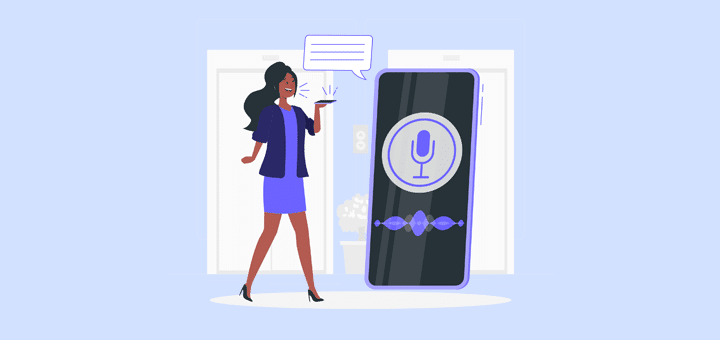
With the rising use of voice assistants, AI can help optimize content for voice search queries. Because it can understand natural language patterns, recognize long-tail keywords, and provide recommendations to optimize content for voice search.
How to Use AI for Voice Search Optimization?
In simpler terms, AI tools analyze voice search queries and identify the most important keywords and phrases. Also, AI technologies understand the intent behind those queries.
As a result, you can optimize your site for voice search using natural language keywords. That’s because people use natural language queries when using voice search. In addition, some AI tools can even generate content optimized for voice search.
In fact, several AI SEO tools offer features for voice search optimization. Some of them are Semrush, Surfer SEO, Majestic, etc.
This means whenever you’re finding keywords, creating content, or optimizing them, these AI-driven tools consider voice search queries. So, all you’ve to do is recognize the ones for improving your content for voice search.

Note: Here’s a list of tips on how you can apply voice search optimization for better SEO:
- Create conversational and natural-sounding content. Avoid using technical terms.
- Use long-tail keywords. Because they’re more specific and use natural language.
- Optimize your content for local search so that a nearby audience finding local businesses through voice search can find you.
8. User Experience and Mobile Optimization
User experience and mobile optimization are crucial for SEO for numerous reasons. Like:
- Mobile friendliness and user experience are vital ranking factors for search engines. So, you must optimize your site accordingly to rank it higher in search results.
- If your site isn’t responsive or gives a bad user experience, then users are more likely to bounce. Having fewer audiences and lower satisfaction levels is bad for SEO.
For a better user experience and mobile optimization, you must consider these things:
- Use responsive design to make your site look and work well on all devices.
- Ensure your website loads quickly, not making users leave your site after waiting.
- Add clear and concise content that’s easy to read on every device.

But how does AI help in all of this? Learn how AI-powered tools can help you improve your site’s user experience and mobile optimization below.
How to Use AI for User Experience and Mobile Optimization?
AI-powered SEO tools like Google Search Console and Google Analytics help you improve the user experience and mobile optimization of websites.
Let’s take the example of Google Analytics. Google Analytics is a powerful SEO tool that you can use in various ways.
Learn how to use Google Analytics in detail from this ultimate guide.
Here’s a list of ways to use it for improving the user experience and mobile optimization:
- You can track user behavior on mobile devices using the Mobile Overview report. This helps you find areas where you can improve websites for mobile users.
- Find the bounce rate and session duration metrics that determine your site’s user experience. If the bounce rate is high, then you need to optimize your site.
- Track user engagement elements like buttons, links, and images. Now, focus on emphasizing the element that has the highest percentage of users clicking.
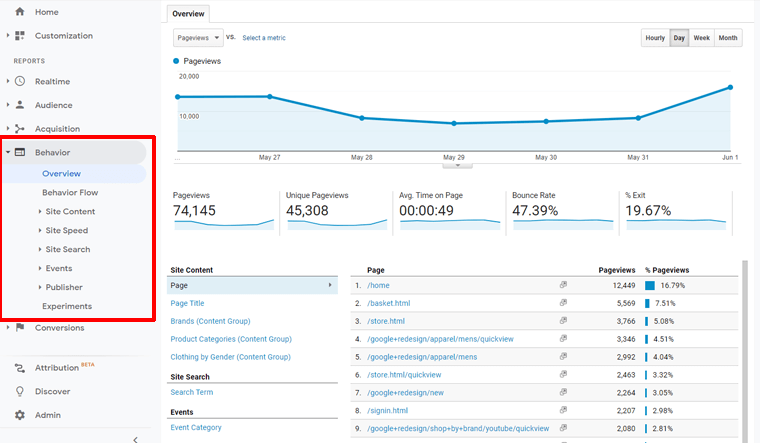
Note: You’ll find various insights in your AI SEO tool that help you boost the user experience and mobile optimization. But you’ve got to focus on the right metrics, analyze your data regularly, and take action for faster results.
9. Rank Tracking and Reporting
After going through all the optimization processes for improving SEO, you must regularly track your rank and analyze the reports. Rank tracking and reporting are vital because:
- It measures the effectiveness of your SEO efforts.
- Guides to identify the areas that need improvement.
- Lets you stay ahead of the competition.
- Provide evidence of SEO’s value to clients.

Did you know? AI can be a valuable tool for rank tracking and reporting in SEO. Thus, AI-driven tools can automate the process of tracking keyword rankings, providing ranking insights, and generating actionable reports.
How to Use AI for Rank Tracking and Reporting?
Many AI SEO tools help you track your website’s rank and provide reports. Some popular options are Semrush, Surfer SEO, SE Ranking, Ahrefs, etc.
So, first, you must select the right tool based on its features, price, and ease of use. For instance, let’s use Semrush to show you can use AI for SEO.
On your Semrush account, add your website as a project if you haven’t done it yet. Then, open the Position Tracking tool. There, choose your project and hit the ‘Set up tracking’ button.
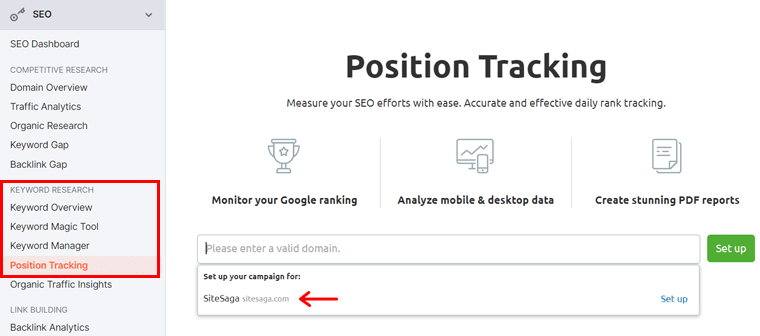
This opens a new interface where you must select the search engine and device type. Also, add your business name and location. Next, click the ‘Continue to Keywords’ option.
Afterward, enter the target keywords and click the ‘Add keywords to campaign’ button. Then, click the ‘Start Tracking’ button.
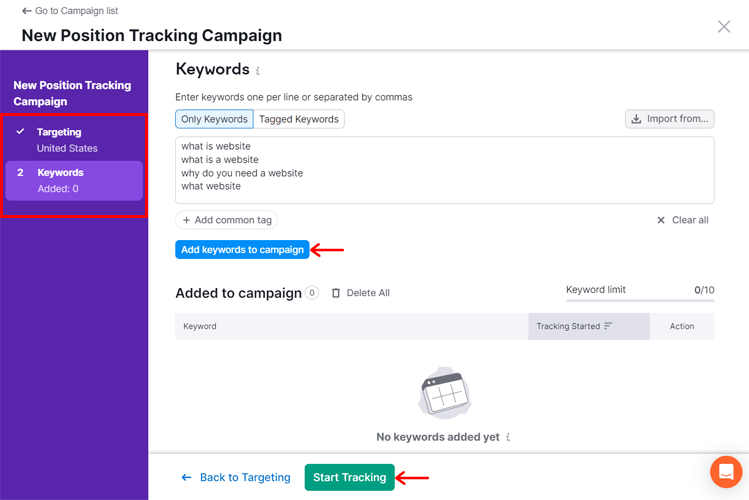
In a while, you’ll find the position tracking results. Here, you can check the rankings, ranking distribution, competitors, etc., on multiple devices.
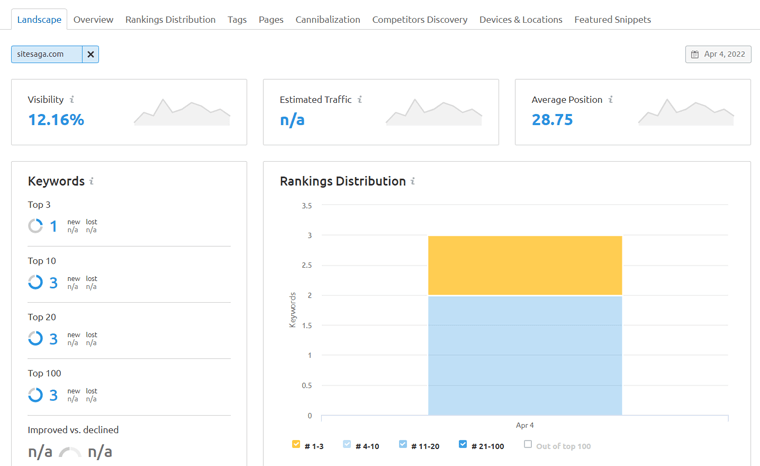
That’s all about rank tracking. In addition, you can generate reports on your keyword rankings for individual keywords or groups of keywords.
Note: Compare your rankings and reports with those of your competitors. Accordingly, make changes to your content and approach to improve your SEO based on the insights.
Risks and Limitations of AI in SEO
There’s been a significant transformation in SEO after the use of AI. But you must be aware of the potential risks and limitations associated with the use of AI in SEO.
The following list shows the risks and limitations you must consider:
- Lacks Human Intuition: AI relies on historical data and patterns to make decisions. But this lacks the intuitive understanding and context that humans possess. So, certain misinterpretations can result in inaccurate optimizations.
- Bias and Discrimination: The use of biased data for training AI can give biased search results. This may result in potentially discriminatory outcomes in SEO.
- Algorithm Changes: With the constant evolution of search engine algorithms, AI tools may become less effective. So, you must monitor and adapt to those changes.
- Overdependence on Automation: Full dependence on AI for SEO can be risky. They can lead to missed opportunities and an inability to adapt to unique situations.
- Ethical Concerns: The use of AI in SEO raises ethical concerns like data security and privacy. So, your tool must secure data and comply with privacy regulations.
- Increased Competition: AI SEO tools can increase competition among businesses. And small companies without access to AI tools may struggle to keep up with it.
Hence, it’s vital to balance AI-driven SEO and human expertise to mitigate these risks and limitations. You must take part in critical thinking and web performance monitoring. This ensures the ethical use of AI for SEO to gain the potential advantages of the technology.
Frequently Asked Questions (FAQs) on AI SEO
Last but not least, check out some FAQs on AI SEO. Going through them, a lot of your basic confusion about using AI for SEO may disappear. So, let’s go!
AI can analyze historical data and patterns to make predictions about search engine algorithm updates. However, algorithm updates are complex, making AI tools unable to guarantee accurate predictions.
Potential biases in algorithms, the need for high-quality training data, and complex search engine algorithms require continuous adaptation. All of these are obstacles and limitations to employing AI in SEO.
Some ethical considerations in using AI in SEO involve ensuring transparency and fairness in algorithmic decision-making. Also, it involves avoiding deceptive practices, user privacy protection, and data security.
To effectively leverage AI for SEO, it’s better to have an understanding of some areas. That includes search engine algorithms, data analysis, programming, and ethical SEO practices.
Yes, AI can automate SEO tasks like keyword research, content optimization, and performance tracking. This saves time for marketers to focus on other strategies.
If you’re new to creating your business online, then learn how to make a website here. We have a detailed guide for beginners.
Conclusion
And that’s a wrap! We’re at the end of this article on how to use AI for SEO. Hopefully, you agree with our 9 innovative ways to use AI for SEO.
In a nutshell, you can use AI for various SEO aspects. That includes keyword research, content creation, on-page optimization, link building, etc. For that, you’ll find various tools and techniques. So, we hope you find them helpful!
If you have more questions, then ask them in the comment section below. We’re always there to solve your queries and guide you at any time.
Further, read some helpful guides on the best AI website builders, AI tools for digital marketing, and AI-powered chatbots.
Lastly, follow us on Facebook and Twitter to access more blogs similar to this.
